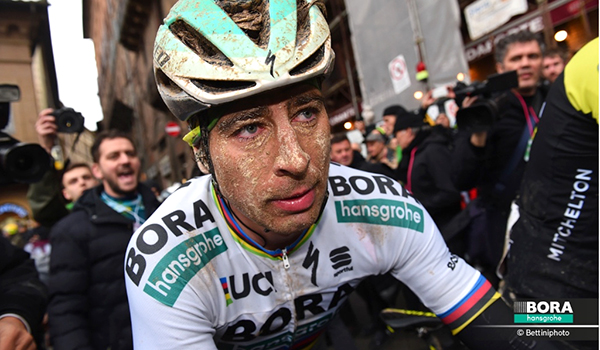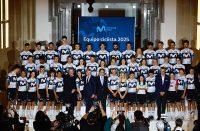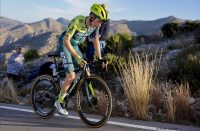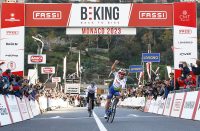
The cold and wet weather conditions of the twelfth edition of the Strade Bianche saw riders covered in the grit and grime of the famous white Italian roads. These conditions took their toll on riders, with the weather sapping both energy and morale. In his first race since the Tour Down Under, and his first European race of the season, the UCI World Champion, Peter Sagan, was supported well by his BORA-hansgrohe teammates, but was unable to take the victory in Siena, taking eighth position, while teammate Gregor Mühlberger rounded off the top ten in tenth spot.
The Stage
The 184km route would be challenging for a number of reasons. The undulating terrain would sap energy, while the transitions from road to gravel in each of the race’s eleven sectors of ‘Strade Bianche’ would test bike riders’ handling skills to the limit, ranging in length from less than a kilometre to almost 12km. When the weather is good, this race takes in some of the most stunning Tuscan scenery. When the weather is poor, the riders are not only drenched by rain, but also covered in dust from the race’s famous white gravel roads. This both saps morale, but also adds an element of risk, making the road surfaces slippery, while luck plays a much greater role, as riders can be taken out of contention with punctures and mechanical problems. In the end, it would all come down to who would still be in contention for the final brutal climb in Siena for the race’s finale.
The Team Tactics
With some of the team having raced Omloop Het Nieuwsblad earlier in the week, some of the team riding today would have an idea of how the colder weather would affect the outcome. The UCI World Champion, Peter Sagan, would be making his first European appearance of the season having last raced at the Tour Down Under in January. This race would be a good opportunity for the Slovak rider to test his form at the start of the Spring Classics season.
The Race
An early break took control early on in the day, and with the conditions as bad as they were, looked as though they might stay out ahead for the whole day – especially after the peloton split in two. The escapees had to ride in the same conditions however, and these conditions had a clear impact, with some suffering in the bad weather, and others dropping off due to punctures. With 60km remaining, the small escape group was caught and the race started heating up. Attacks, counter-attacks and chases saw the UCI World Champion, Peter Sagan, in one of the chasing groups, with strong support from teammates Daniel Oss and German National Champion, Marcus Burghardt, but as the leaders entered Siena for the final 10km, it was clear that Peter would not be in a position to fight for the win. It was the stronger climbers who were making the most progress on the remaining hills, with Lotto Soudal’s Benoot managing to hold his lead on the front. After a hard ride, Peter finished in eighth position, with teammate Gregor Mühlberger close behind in tenth.
Results
01 T. Benoot 5h03’33”
02 R .Bardet + 0:39
03 W. Van Aert + 0:59
08 P. Sagan + 2:08
10 G.Mühlberger + 2:16
From the Finish Line
“There is no doubt that the Strade Bianche lived up to its reputation this year with a very hard day under difficult weather conditions. It was my first race after spending nearly a month at the high-altitude training camp and the sensations were good. We showed we had a strong squad with Daniel Oss, Marcus Burghardt and Gregor Mühlberger doing great work at the front. I’m happy with today’s result, although, obviously, we could have wished for more. However, it’s just the beginning of my European races and there is a long way ahead of us.” – Peter Sagan, UCI World Champion
“It was a tough Strade Bianche, made more difficult with the adverse weather. I think we saw that our guys were in good shape and for some of them, it was their first race after a long training period. In my opinion, they were strong but maybe not strong enough, yet, to win the race. With 30km to go, when the attacks came, I feel Peter didn’t have the best legs but I’m definitely sure he will get better at the Tirreno-Adriatico as he gets back to racing mode. I’m satisfied with what we achieved today, in a day that in my view was best suited for the climbers. Today’s conditions and parcours was more for them.” – Enrico Poitschke, Sports Director




